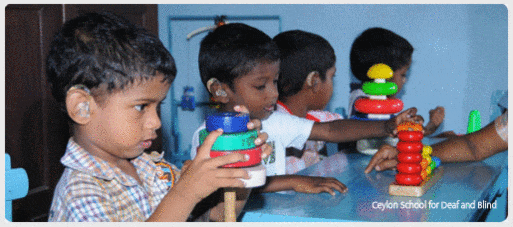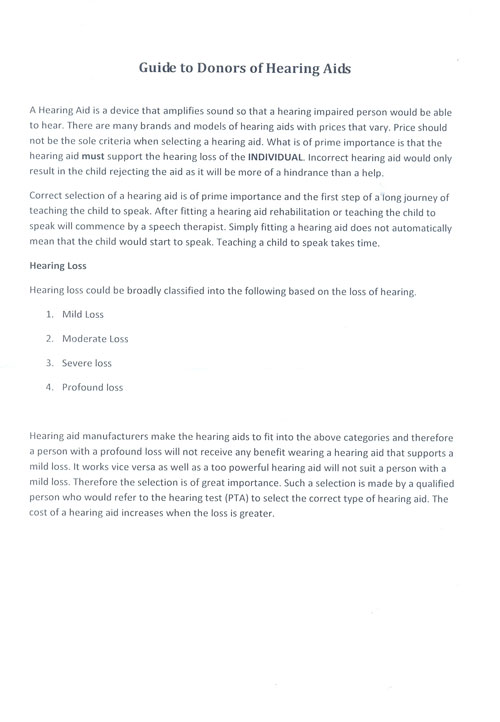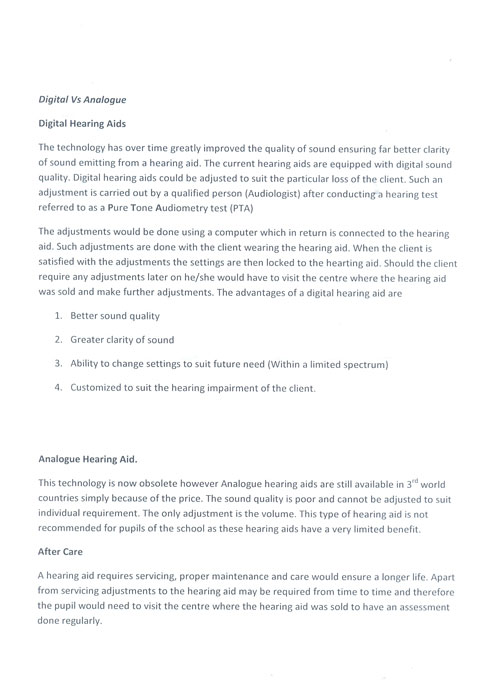-
Pre school
The education program at the school starts with infants. Parents are encouraged to bring hearing-impaired infants to the school daily for a re-habilitation program -
An important part of this program is to teach parents how to manage these children and to encourage their development.
Every effort is made to use whatever residual hearing that deaf children have to try and teach them to vocalize and speak. Modern FM Group Hearing Aid Systems and other powerful hearing aids are used.When we are successful in getting children to vocalize, such children are encouraged to seek admission to mainstreams schools, where they are able to develop at a rapid pace.
Those who cannot be taught to speak in the Pre-School, proceed to the Primary, where such efforts to teach them to speak continue. .
-
Primary
Most children join the school as fulltime residential students of the Primary. Children are taught the normal curriculum of general subjects as in main stream schools. -
There is no special syllabus for the hearing impaired.
.
In the Primary, the focus shifts to teaching students a written language. Here too deaf students are at a disadvantage, because they cannot vocalize properly. A spoken/written language is meaningless to them. However, it is essential that they learn to read, write and understand Sinhala at Ratmalana, and Tamil at Nuffield School Jaffna. The textbooks they use are in the mother tongue, as are the question papers at examinations. Teaching Sinhala or Tamil is an uphill task! .
-
Secondary Education
The focus in Secondary Education is to prepare students for the General Certificate of Education "Ordinary" level examination. -
The syllabus, is so wide that even in mainstream schools, it is not possible to cover this syllabus in the time available. The GCE 'O' level syllabus for hearing impaired students is the same as for all other students. At our school, we have introduced Computer Assisted Classroom Teaching and Multimedia techniques to assist the teacher to present a lesson.
Classroom teaching employs both sign language and Sinhala. It is therefore essential that students' hearing aids should be of the highest quality. Currently, the limited vocabulary and lack of language skills hinders a deaf child's performance at the GCE "O" level examination.
-
Teaching Deaf Students to Read & Write
Normally children start to speak from as young as 1 1/2 years. Children learn by asking questions thus speech plays a very important role in the learning process. -
The syllabus, is so wide that even in mainstream schools, it is not possible to cover this syllabus in the time available. The GCE 'O' level syllabus for hearing impaired students is the same as for all other students. At our school, we have introduced Computer Assisted Classroom Teaching and Multimedia techniques to assist the teacher to present a lesson.
.
Classroom teaching employs both sign language and Sinhala. It is therefore essential that students' hearing aids should be of the highest quality. Currently, the limited vocabulary and lack of language skills hinders a deaf child's performance at the GCE "O" level examination.
-
Computer Aided Teaching
The school has recently introduced Computer Aided Teaching to augment classroom teaching. -
Lessons are made interesting by using pictures, animations, sounds etc. Interactive software guides a student through a lesson A computer is an infinitely patient teacher, with the ability to repeat a lesson until it is mastered. Providing each student with a computer, enables the student to work at his own pace. Currently the computer system covers 400 words. Our experience is that this form of education is effective, and they make rapid progress.
.
-
Audiological Services
The School has been gifted with a state-of-the-art Audiology Centre. -
The Centre is equipped to carry out a complete range of tests, including
● Otoacoustic Emissions (OAE) Test
● Auditory Brainstem Response (ABR) Test
● Pure Tone Audiometry
● Tympanometry
● Auditory Steady State Response (ASSR) Test – for infantsThe services of this center are made available to the hearing impaired. This service is also made use of by ENT surgeons for diagnostic purposes. Patients are referred by ENT surgeons, General practitioners, medical clinics etc, to the clinics held on weekdays . A very reasonable fee is charged from these patients.
.
The Ear Mould laboratory specializes in manufacturing correctly fitted ear moulds to suit the individual ear and the personal hearing aid of the student / client is fitted into it.

Managed by Four Corners Lanka (Pvt) Ltd.






 .
.